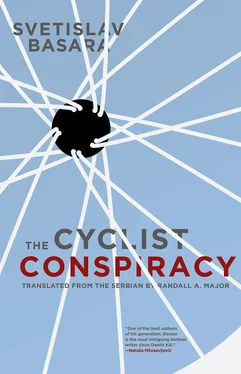There, that proves that I am still a poet in my soul and also an ever greater admirer of Doctor Freud, because then you hate only whatever is in you, projected on others, naturally, for the sake of personal security. Perhaps I exaggerated a bit with my judgment of poets. Why would poets be bigger scoundrels than everyone else? However, that cannot be said about Nietzsche. I hated Nietzsche all at once, at first sight. That arrogant linguist filled me with horrible anger from the first reading to the last, the Superman! How contemptible! What ontological nonsense! A man cannot be a man; a man cannot, if we want to tell the truth, be anything, and Nietzsche would like to be a Superman. That seemed to me to be an indescribable blasphemy of God, in whom I did not believe at the time, by the way. I have met a multitude of guys who were indoctrinated by Nietzsche. And yet, Nietzsche was loved by the Nazis, who are faggots, and faggots love syrupy and bombastic rhetoric. In any case, take note: with his physiognomy, especially with the style of his moustache, Nietzsche looks undeniably like Stalin, though actually like a kitsch copy; Stalin was incomparably more handsome. Not to mention the difference in types: Stalin was a phallic type, Nietzsche an oral type. In any case, he is slowly being forgotten because the world is gaining ever greater insight into its nothingness, and his meanderings are becoming ridiculous.
The irrational explanation of the secret
I do not understand how someone can refuse to believe that the Savior turned water into wine. Today, there is widespread disbelief that water was turned into the finest wine at the wedding in Canaan, unfortunately even among alcoholics, which is pitiful because even we have the ability to transform things, into something worse, of course, because we are depraved. We turn wine, alchemically, into a fluid that is improper to mention in this text.
On the afterlife
Not believing in the afterlife is absurd. It is impossible that one can be further beyond the grave than in this life. I was told that by a ghost with whom, in decadent style, I recently established contact. The supposition that they over there are absolutely dead, arises from the dangerous supposition that we here are absolutely alive.
On egalitarian doctrines
It is interesting that the greatest number of supporters are attracted by the most unreasonable doctrines of the phallic types: fascism and communism. It would be worthwhile to think that through more seriously. One thing is quite unclear to me — the disgust of the humanistic intelligentsia at the rigged trials that are now being held in Moscow and Berlin. What did they expect? The very idea of bolshevism — to make people equal — is unnatural. People are not equal. And since it is impossible to make them equal by raising the general level of culture and giftedness, the equalization is carried out by lowering the level, by the decisive throttling of everything that rises above the grayness of the average. Such a society is stepping out of reality, which anyway is not overly real; it is a virtue to die working, a virtue to report your father for listening to foreign radio stations. How can you expect guiltiness to be real in a country where virtue is false?
However, this phenomenon is not new. We have the Crusades, led with the goal of capturing Christ’s grave, as if the Savior is the God of graves and death, and not of the resurrection and true life. The thing that irritates us most in history is doubtless the cynicism with which evil, in order to justify itself, pulls on the mask of the good.
Epilogue
I have arrived at the following conclusion: whoever does not wish to destroy others must destroy himself. No other choice. If you don’t want to destroy either others or yourself, you will be destroyed by others.
A LETTER TO BRANKO KUKIĆ (DATE UNKNOWN)
During our extensive evening conversations long ago, we often touched on topics which I readily reflect on but rarely talk about, not out of the fear that one of the mischievous walls might hear and report us to the organs of those inquisitive Services, but from my inherent skepticism about the power of speaking, and even about its usefulness. Instead, I have opted to write you a long letter. Only when words are written, when they are purified of the rashness brought out by emotions, inhibitions and complexes, when they are shackled by the rigid discipline of printed lines — only then do they speak out in a refined way. As history has moved forward, the terror of words has become so totalitarian that I have the right to make the claim that words, their clichés and models formed of old, are the ones who govern us, and not vice versa. In these days, which are probably the last ones, it is completely unimportant who does what to whom; only what someone says is taken into account, and that paradoxical situation was created fairly long ago — back when people started talking about God instead of doing what God’s commandments required. Recently, in an edition of Theology which you were so kind to send me, and which is dedicated to the Holy Spirit, I found unambiguous evidence to support the thesis I have proposed. The effort to overcome the split in the Christian world through the ecumenical encounters of Catholic and Orthodox theologians is quite praiseworthy, because that split came about, I am convinced, primarily because of verbalism. Yet, as far as I have managed to discern, those encounters are conversations falling on deaf ears in which, to my surprise, the Catholic theologians have shown a much higher degree of tolerance and inclination toward the mystery than the Orthodox have, even though the latter, educated in the Platonic spirit of the Eastern Church, should be showing less inclination to formalism and blind faith in Patristics, in the authority of saints who were, over a period of time (not through their own fault and not to the detriment of their holiness), placed between people and God, so that some quite profane “saints” could encroach on that interval space later, on that unprepared soil, at a certain historical moment, negating the existence of God. That is why I do not find it strange in the least that the idea of communism was brought into reality precisely in the Orthodox countries which, nolens volens , also dragged their Catholic Slavic brothers into the same round-dance. In my intolerance toward cataphatism of any sort, I go so far and with such arrogance that I am prepared to listen to the theology of one of my contemporaries only if he has been nailed to a cross.
However, that is also a theology. Hence, it is better if I return to the terrain of your specific interest and mine, to literature. I flatter myself that the prose I write is apophatic to the highest possible degree. Being as it is, negating, completely focused on proving the extent to which a man is not a man, it is understandable that it is fairly alien to me. I absolute refuse to disown my books; they are still the best thing I have created in my life. Disowning one’s work is always motivated by the same metaphysical disagreements as suicide is. As Schopenhauer said, suicide is not the pathological absence of the will to live, but the pathological excess of the will to live, to live the absolute fullness of life without God, and that is the justifiable reason why it has been proclaimed as one of the greatest of sins. In my case, the breakup between me and my books was consensual. I do not care about them, but I share my name with them and in return I get a certain amount of income. Readers need books, I need the money, little power and respect that they provide me so that I can physically more easily “walk my path on crutches” (Broch). I do not need readers; they are the friends of those books, not mine; I avoid, whenever possible, all encounters with those who enjoy reading that prose. Being an impassioned member of that same sort that I simultaneously despise and appreciate, I can never establish close contact with another reader, unless he is completely silent about what he has read or speaks only when completely drunk.
Читать дальше












